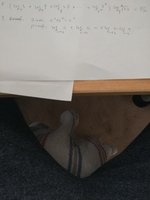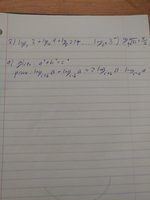You are using an out of date browser. It may not display this or other websites correctly.
You should upgrade or use an alternative browser.
You should upgrade or use an alternative browser.
Tough Problems
- Thread starter Soracyn11
- Start date
No one can read them, and you have shown no work.
AS YOU HAVE BEEN TOLD BEFORE
Read the page https://www.freemathhelp.com/forum/threads/read-before-posting.109846/ and then follow it.
One problem per thread.
Show what work you have done.
If you can't start, explain what you have thought about trying.
AS YOU HAVE BEEN TOLD BEFORE
Read the page https://www.freemathhelp.com/forum/threads/read-before-posting.109846/ and then follow it.
One problem per thread.
Show what work you have done.
If you can't start, explain what you have thought about trying.
Dr.Peterson
Elite Member
- Joined
- Nov 12, 2017
- Messages
- 16,604
That's still hard to read. But one way to start would be to use the change of base formula to express everything in terms of logs in one base.
Give that a try, and show some work. Or at least tell us the context of the question: What have you learned that might be relevant?
Give that a try, and show some work. Or at least tell us the context of the question: What have you learned that might be relevant?
Dr.Peterson
Elite Member
- Joined
- Nov 12, 2017
- Messages
- 16,604
Don't just think; do! Sometimes what you don't think will help, does, when you actually see it written out.I don't think making the base the same would help in this scenario. The log properties I've learned like multiplication of log becomes addition seems irrelevant for these problems.
But if you show us any work at all, we can correct errors or suggest changes. When you just describe what you did, we can't tell where you might be going off track.
With respect to the second problem, let's take an example and work it through
[MATH]a = 4,\ b = 3, \text { and } c = 5 \implies c - b = 2 \text { and } c + b = 8.[/MATH]
[MATH]log_{8}(4) + log_{2}(4) = log_2(4) + \dfrac{log_2(4)}{\log_2(8)} = 2 + \dfrac{2}{3} = \dfrac{8}{3}.[/MATH]
[MATH]2log_8(4) * log_2(4) = 2 * \dfrac{log_2(4)}{\log_2(8)} *log_2(4) = 2 * \dfrac{2}{3} * 2 = \dfrac{8}{3}.[/MATH]
The proposition is true in this case, which we found by using the change of base formula. So Dr. Peterson's suggestion has at least some promise.
[MATH]a = 4,\ b = 3, \text { and } c = 5 \implies c - b = 2 \text { and } c + b = 8.[/MATH]
[MATH]log_{8}(4) + log_{2}(4) = log_2(4) + \dfrac{log_2(4)}{\log_2(8)} = 2 + \dfrac{2}{3} = \dfrac{8}{3}.[/MATH]
[MATH]2log_8(4) * log_2(4) = 2 * \dfrac{log_2(4)}{\log_2(8)} *log_2(4) = 2 * \dfrac{2}{3} * 2 = \dfrac{8}{3}.[/MATH]
The proposition is true in this case, which we found by using the change of base formula. So Dr. Peterson's suggestion has at least some promise.
Dr.Peterson
Elite Member
- Joined
- Nov 12, 2017
- Messages
- 16,604
One trick I used for the second (which isn't necessary, but did help me get to something useful more quickly) is to use the fact that [MATH]log_m(n) = \frac{1}{log_n(m)}[/MATH] (an implication from the change of base formula). That immediately puts everything in terms of base a.


